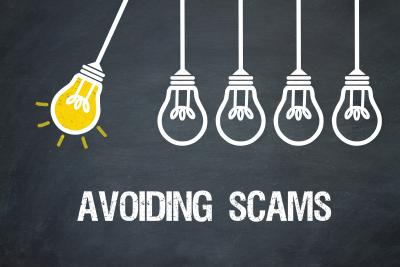February 2020: Avoiding Scams
Scammers are constantly finding new ways to steal your money. You can protect yourself by knowing what to look out for.
Debt Collection Scams
Most debt collectors will contact you to collect on legitimate debts you owe. But there are scammers who pose as debt collectors to get you to pay for debts you don't owe or that have already been paid. Do not give any personal financial information until you can verify the debt.
Debt Settlement/Relief Scams
Debt settlement companies say they can renegotiate, settle, or in some way change the terms of a person's debt to a creditor or debt collector. Many times, scammers are behind these calls and do not have the intention of helping you. To find reputable help, start with a credit union, local college, military base, or the U.S. Cooperative Extension Service. And if you decide to work with a debt relief service, remember this:
- A legitimate debt relief company won’t make you pay up front. That’s illegal.
- No one can guarantee that your creditors will forgive your debts.
- Your report can help stop a debt relief scam. If you spot one, tell the FTC.
Foreclosure Relief Scams
Foreclosure relief or mortgage loan modification scams are schemes to take your money or your house - often by making a false promise of saving you from foreclosure.
If you are having trouble making payments on your mortgage, a HUD-approved housing counselor can help you assess your options and avoid scams. If you think you may have been a victim of a foreclosure relief scam, you may also want to consult an attorney.
Grandparent Scam
If you get a call from someone who sounds like a grandchild or relative asking you to wire or transfer money or send gift cards to help them out of trouble, it could be a scam. To detect and avoid the Grandparent Scam, NCL’s Fraud Center recommends the following tips:
- Beware of any urgent solicitation of funds, especially if it is needed to pay for unexpected bills, such as bail money, lawyer’s fees, or doctor bills
- Before sending funds, independently contact the relative (or parent of the relative) the scam artist is claiming to be (or represent) at a known phone number to verify the details of the story.
- Scam artist’s payment method of choice is the wire transfer. Any urgent request to wire money should be treated suspiciously.
- Be aware that fraudsters attempting the Grandparent Scam may call late at night to confuse potential victims.
Imposter Scams
Imposter scammers try to convince you to send money by pretending to be someone you know or trust like law enforcement officials, government employees, or a charity organization. Remember, caller ID can be faked. Call the organization and ask if the person works for them before giving any money.
Mail Fraud
Mail fraud letters look real but the promises are fake. A common warning sign is a letter asking you to send money or personal information now to receive something of value later. Be suspicious of the following common types of high-risk mail you may receive:
- Notices of prizes, sweepstakes winnings, vacations, and other offers to claim valuable items
- Personal appeals for money or information from people you do not know
- Letters from psychics or religious figures offering to predict or change your future
Mortgage Closing Scams
Mortgage closing scams target homebuyers who are nearing the closing date on their mortgage loan. Be aware that the scammer attempts to steal the homebuyer's closing funds—for example, their down payment and closing costs—by sending the homebuyer an email posing as the homebuyer's real estate agent or settlement agent (title company, escrow officer, or attorney).
Lottery or Prize Scams
Scammers will call or email congratulating you on being a winner with an ask for an upfront payment for fees and taxes. Similarly, a scammer might ask you to pay money in advance to get sweepstakes prize winnings. More likely, it’s a prize scam, and you’ll find the prize isn’t worth much — if you get a prize at all. Here’s one way to think about it: if you have to pay, it’s not a prize.
The above information was obtained from the Federal Trade Commission. For more information from the FTC about scams, please visit www.consumer.ftc.gov/features/scam-alerts.
IDENTIFYING THEFT
Keep an eye out for identity theft by reading your statements from credit card companies or banks and credit unions and checking your credit reports for suspicious activity.
Financial Accounts & Billing Statements
Look closely for charges you did not make. Even a small charge can be a danger sign. Thieves sometimes will take a small amount from your checking account and then return to take much more if the small debit goes unnoticed.
Credit Reports
Review your free credit reports from each of the three major credit bureaus. If an identity thief is opening financial accounts in your name, these accounts may show up on your credit report. Look for:
- Inquiries from companies you’ve never contacted
- Accounts you didn’t open
- Wrong amounts on your accounts
The above information was obtained from the Consumer Financial Protection Bureau. For more information about fraud and identity theft, please visit www.consumerfinance.gov/consumer-tools/fraud.
Winter Springs Police SHIELD 360
The SHIELD 360 Program will send an officer to your home or business, at your request, to evaluate your potential risk to crime and ways to prevent crime. These are called Residential Crime Prevention Surveys or Commercial Crime Prevention Surveys. Upon completion of your survey, you will be provided with a list of suggestions to reduce your vulnerability to crime.
Residents participating in the program will receive a lawn placard. Display your placard in your front yard to show your community you are taking an active role in crime prevention. Businesses will receive a window decal to show your customers you are reducing risk to your business.

